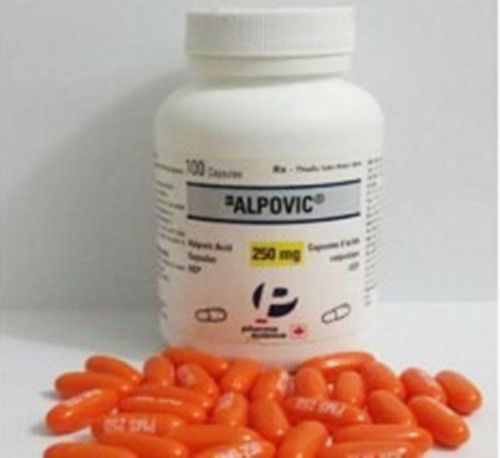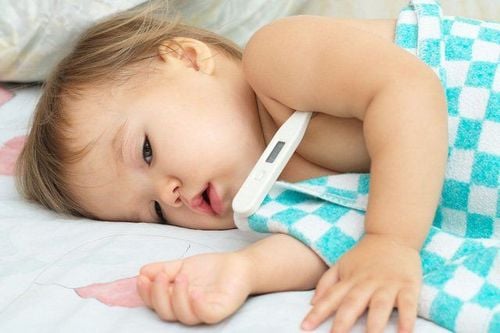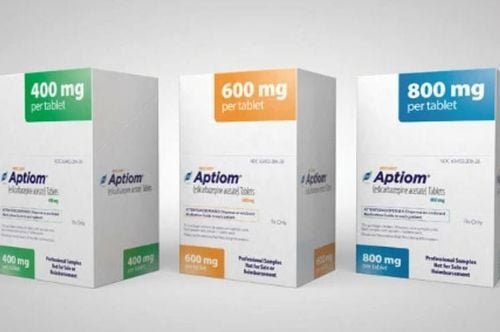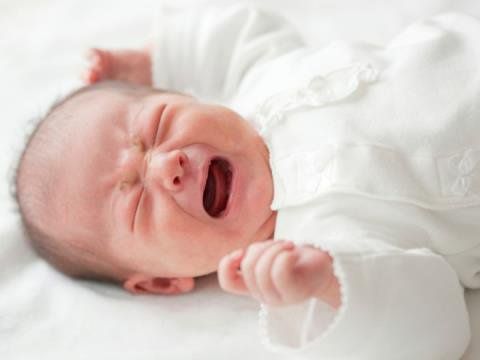This is an automatically translated article.
The article was consulted with Specialist Doctor I Nguyen Thi My Linh - Neonatologist - Department of Pediatrics - Neonatology - Vinmec Danang International General Hospital.Febrile convulsions in children can be simple or complex. Most over 90% of febrile seizures are simple. Fever in children can be caused by a bacterial or viral infection. In some cases, fever may appear after vaccination such as measles, chickenpox, .... from there, there is a risk of convulsions in some children.
1. What is a febrile convulsion?
Febrile convulsions, commonly known as febrile convulsions, are convulsions caused by high fever in young children. When a child has a febrile convulsion, the child will often lose sensation and the limbs will convulse and shake for a certain period of time. Febrile convulsions usually occur in children aged 6 months to 5 years and are rare in older children.Most often, febrile convulsions are severe in children with a temperature greater than 38.9 degrees Celsius. However, children with febrile seizures are not epilepsy, because epilepsy is characterized by recurrent seizures and The cause of epilepsy does not have to start with a fever.
Febrile seizures in children can be simple or complex. However, the majority over 90% of febrile seizures are of the simple form. Fever in children can be caused by a bacterial or viral infection. In some cases, fever may appear after vaccination such as measles, chickenpox, .... from there, there is a risk of convulsions in some children.
Genetic and familial factors are likely to increase febrile seizures in children. In particular, identical twins have a much higher incidence of febrile seizures than fraternal twins. But most febrile seizures happen within the first few days of a child's high fever.
The most common symptoms of a child having a febrile convulsion are:
Loss of consciousness lasting 30 seconds - 5 minutes or more than 15 minutes; The child has muscle contractions all over the body for 15-20 seconds, has trouble breathing, shakes or jerks arms and legs strongly; When having a convulsion due to high fever, the child may have additional accompanying signs such as vomiting, foaming at the mouth, pupils turned up, making the eyes white; Children lose control of bowel movements; Due to loss of consciousness and high fever, strong convulsions, children may bite their tongue or cheeks, clench their teeth or have blue skin.
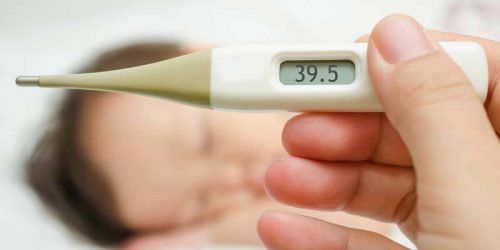
2. Features of simple and complex febrile seizures
Most febrile seizures will last from 30 seconds to 1 or 2 minutes, in some cases for more than 15 minutes. Children with febrile seizures will often have an anal temperature greater than 38.9 degrees Celsius.The symptoms of febrile convulsions in children are similar to those of epilepsy, so many people often confuse them. However, febrile seizures are not usually life-threatening and they may go away on their own after a short period of time. Febrile seizures in children can be simple or complex. The characteristics of simple and complex febrile seizures are as follows:
Characteristics of simple febrile seizures: The average duration of a simple febrile seizure in children is < 15 minutes and There were no focal neurological signs and no second convulsion within 24 hours. Features of complex febrile seizures: The duration of complex febrile seizures in children usually lasts ≥ 15 minutes continuously or stops, has some focal nature, or recurs within 24 hours.

3. Treatment of febrile convulsions in children
Treatment when a child has a convulsion:When you notice symptoms of a convulsion due to high fever in your child, you need to stay calm and should put the child in a prone position to avoid choking on sputum. You may feel scared when a seizure occurs in your child, however, if you know how to stay calm, you can perform this first aid well. Keep one leg extended and the other bent, loosen the shirt around the neck and do not put anything in the child's mouth or try to pry the child's teeth and do not press the child to accompany the seizure. . After the child has stopped convulsing, quickly take the child to a medical facility for emergency treatment. Treatment of high fever in children:
Supportive treatment if the seizure lasts < 15 minutes with anticonvulsants. Children with febrile convulsions need to reduce the fever. Antipyretic is aimed at preventing another febrile seizure during the illness and at the same time preventing febrile status epilepticus convulsions in children. In the case of seizures lasting ≥ 15 minutes in a child, medication may be necessary to relieve the seizure and carefully monitor the circulatory and respiratory status. Intubation may be required if response is not immediate and the infant's seizures persist. The drug usually used in this case is intravenous, with short-acting benzodiazepines; Fosf`enytoin 15 to 20 mg PE. For children younger than 5 years of age, 0.5 mg/kg diazepam rectal gel may be given once and repeated in 4 to 12 hours if intravenous lorazepam cannot be given. Phenobarbital or levetiracetam and valproate can also be used to treat febrile seizures in children.
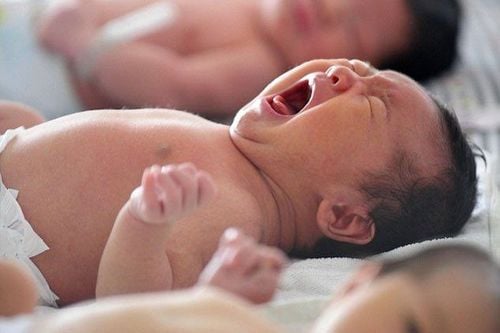
4. Prevention of convulsions caused by high fever in children
For parents who have children with high fevers having seizures, it is necessary to closely monitor the child's temperature when the child is sick and reduce the fever with the correct dose if the child's temperature is high. It is absolutely not recommended to maintain anticonvulsants to prevent recurrent febrile seizures in children or strong, non-febrile convulsions unless there are multiple or prolonged episodes in the child. A doctor can be consulted to prescribe rectal diazepam for parents to use at home during a child's persistent febrile convulsion. Although febrile convulsions in children can cause panic in parents, febrile convulsions in children are considered benign and most likely do not pose a danger to the child, unless the child is traumatized during pregnancy. convulsions. Mortality rates of children with febrile convulsions were not different from those of children without febrile seizures of the same age. Children with high fever convulsions do not affect the child's intelligence.However, convulsions accompanied by fever in children can be a sign of some serious infection, affecting the child's life. Therefore, when a child has a seizure due to high fever, parents need to take the child to a medical facility for timely examination and treatment.
Newborns are generally susceptible to respiratory diseases, respiratory infections and gastrointestinal infections leading to high fever and convulsions. To protect children's health, parents should do well to exclusively breastfeed their babies for the first 6 months (if possible) and vaccinate on schedule. As soon as the child shows symptoms such as anorexia, fatigue, crying, it is necessary to take the child to the hospital to be consulted by a specialist for monitoring and treatment. The pediatric department at Vinmec International General Hospital is the address for receiving and examining diseases that infants and young children are susceptible to: viral fever, bacterial fever, otitis media, pneumonia in children. With a system of facilities, modern medical equipment, sterile space, minimizing the impact as well as the risk of disease spread, Vinmec will bring satisfaction to customers. and is highly appreciated by industry experts with:
Gathering a team of leading pediatricians: including leading experts with high professional qualifications (professors, associate professors, doctors, Master's degree), experienced, worked at major hospitals such as Bach Mai, 108.. The doctors are all well-trained, professional, conscientious, knowledgeable about young psychology. In addition to domestic pediatric specialists, the Department of Pediatrics also has the participation of foreign experts (Japan, Singapore, Australia, USA) who are always pioneers in applying the latest and most effective treatment regimens. . Comprehensive services: In the field of Pediatrics, Vinmec provides a series of continuous medical examination and treatment services from Newborn to Pediatric and Vaccine,... according to international standards to help parents take care of their baby's health from birth to childhood. Advanced techniques: Vinmec has successfully deployed many specialized techniques to make the treatment of difficult diseases in Pediatrics more effective: neurosurgery - skull surgery, stem cell transplantation blood in cancer treatment. Professional care: In addition to understanding children's psychology, Vinmec also pays special attention to the children's play space, helping them to play comfortably and get used to the hospital's environment, cooperate in treatment, improve the efficiency of medical treatment.
Please dial HOTLINE for more information or register for an appointment HERE. Download MyVinmec app to make appointments faster and to manage your bookings easily.





